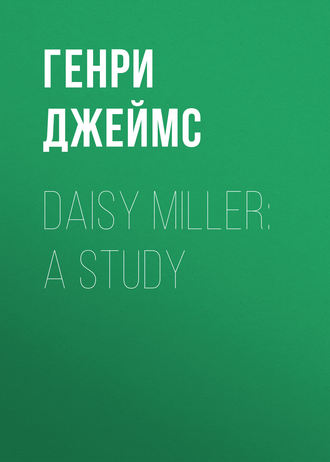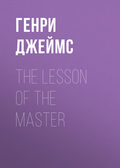
Генри Джеймс
Daisy Miller: A Study
Presently the sound of the woman’s voice came to him distinctly in the warm night air. “Well, he looks at us as one of the old lions or tigers may have looked at the Christian martyrs!” These were the words he heard, in the familiar accent of Miss Daisy Miller.
“Let us hope he is not very hungry,” responded the ingenious Giovanelli. “He will have to take me first; you will serve for dessert!”
Winterbourne stopped, with a sort of horror, and, it must be added, with a sort of relief. It was as if a sudden illumination had been flashed upon the ambiguity of Daisy’s behavior, and the riddle had become easy to read. She was a young lady whom a gentleman need no longer be at pains to respect. He stood there, looking at her—looking at her companion and not reflecting that though he saw them vaguely, he himself must have been more brightly visible. He felt angry with himself that he had bothered so much about the right way of regarding Miss Daisy Miller. Then, as he was going to advance again, he checked himself, not from the fear that he was doing her injustice, but from a sense of the danger of appearing unbecomingly exhilarated by this sudden revulsion from cautious criticism. He turned away toward the entrance of the place, but, as he did so, he heard Daisy speak again.
“Why, it was Mr. Winterbourne! He saw me, and he cuts me!”
What a clever little reprobate she was, and how smartly she played at injured innocence! But he wouldn’t cut her. Winterbourne came forward again and went toward the great cross. Daisy had got up; Giovanelli lifted his hat. Winterbourne had now begun to think simply of the craziness, from a sanitary point of view, of a delicate young girl lounging away the evening in this nest of malaria. What if she WERE a clever little reprobate? that was no reason for her dying of the perniciosa. “How long have you been here?” he asked almost brutally.
Daisy, lovely in the flattering moonlight, looked at him a moment. Then—“All the evening,” she answered, gently. * * * “I never saw anything so pretty.”
“I am afraid,” said Winterbourne, “that you will not think Roman fever very pretty. This is the way people catch it. I wonder,” he added, turning to Giovanelli, “that you, a native Roman, should countenance such a terrible indiscretion.”
“Ah,” said the handsome native, “for myself I am not afraid.”
“Neither am I—for you! I am speaking for this young lady.”
Giovanelli lifted his well-shaped eyebrows and showed his brilliant teeth. But he took Winterbourne’s rebuke with docility. “I told the signorina it was a grave indiscretion, but when was the signorina ever prudent?”
“I never was sick, and I don’t mean to be!” the signorina declared. “I don’t look like much, but I’m healthy! I was bound to see the Colosseum by moonlight; I shouldn’t have wanted to go home without that; and we have had the most beautiful time, haven’t we, Mr. Giovanelli? If there has been any danger, Eugenio can give me some pills. He has got some splendid pills.”
“I should advise you,” said Winterbourne, “to drive home as fast as possible and take one!”
“What you say is very wise,” Giovanelli rejoined. “I will go and make sure the carriage is at hand.” And he went forward rapidly.
Daisy followed with Winterbourne. He kept looking at her; she seemed not in the least embarrassed. Winterbourne said nothing; Daisy chattered about the beauty of the place. “Well, I HAVE seen the Colosseum by moonlight!” she exclaimed. “That’s one good thing.” Then, noticing Winterbourne’s silence, she asked him why he didn’t speak. He made no answer; he only began to laugh. They passed under one of the dark archways; Giovanelli was in front with the carriage. Here Daisy stopped a moment, looking at the young American. “DID you believe I was engaged, the other day?” she asked.
“It doesn’t matter what I believed the other day,” said Winterbourne, still laughing.
“Well, what do you believe now?”
“I believe that it makes very little difference whether you are engaged or not!”
He felt the young girl’s pretty eyes fixed upon him through the thick gloom of the archway; she was apparently going to answer. But Giovanelli hurried her forward. “Quick! quick!” he said; “if we get in by midnight we are quite safe.”
Daisy took her seat in the carriage, and the fortunate Italian placed himself beside her. “Don’t forget Eugenio’s pills!” said Winterbourne as he lifted his hat.
“I don’t care,” said Daisy in a little strange tone, “whether I have Roman fever or not!” Upon this the cab driver cracked his whip, and they rolled away over the desultory patches of the antique pavement.
Winterbourne, to do him justice, as it were, mentioned to no one that he had encountered Miss Miller, at midnight, in the Colosseum with a gentleman; but nevertheless, a couple of days later, the fact of her having been there under these circumstances was known to every member of the little American circle, and commented accordingly. Winterbourne reflected that they had of course known it at the hotel, and that, after Daisy’s return, there had been an exchange of remarks between the porter and the cab driver. But the young man was conscious, at the same moment, that it had ceased to be a matter of serious regret to him that the little American flirt should be “talked about” by low-minded menials. These people, a day or two later, had serious information to give: the little American flirt was alarmingly ill. Winterbourne, when the rumor came to him, immediately went to the hotel for more news. He found that two or three charitable friends had preceded him, and that they were being entertained in Mrs. Miller’s salon by Randolph.
“It’s going round at night,” said Randolph—“that’s what made her sick. She’s always going round at night. I shouldn’t think she’d want to, it’s so plaguy dark. You can’t see anything here at night, except when there’s a moon. In America there’s always a moon!” Mrs. Miller was invisible; she was now, at least, giving her daughter the advantage of her society. It was evident that Daisy was dangerously ill.
Winterbourne went often to ask for news of her, and once he saw Mrs. Miller, who, though deeply alarmed, was, rather to his surprise, perfectly composed, and, as it appeared, a most efficient and judicious nurse. She talked a good deal about Dr. Davis, but Winterbourne paid her the compliment of saying to himself that she was not, after all, such a monstrous goose. “Daisy spoke of you the other day,” she said to him. “Half the time she doesn’t know what she’s saying, but that time I think she did. She gave me a message she told me to tell you. She told me to tell you that she never was engaged to that handsome Italian. I am sure I am very glad; Mr. Giovanelli hasn’t been near us since she was taken ill. I thought he was so much of a gentleman; but I don’t call that very polite! A lady told me that he was afraid I was angry with him for taking Daisy round at night. Well, so I am, but I suppose he knows I’m a lady. I would scorn to scold him. Anyway, she says she’s not engaged. I don’t know why she wanted you to know, but she said to me three times, ‘Mind you tell Mr. Winterbourne.’ And then she told me to ask if you remembered the time you went to that castle in Switzerland. But I said I wouldn’t give any such messages as that. Only, if she is not engaged, I’m sure I’m glad to know it.”
But, as Winterbourne had said, it mattered very little. A week after this, the poor girl died; it had been a terrible case of the fever. Daisy’s grave was in the little Protestant cemetery, in an angle of the wall of imperial Rome, beneath the cypresses and the thick spring flowers. Winterbourne stood there beside it, with a number of other mourners, a number larger than the scandal excited by the young lady’s career would have led you to expect. Near him stood Giovanelli, who came nearer still before Winterbourne turned away. Giovanelli was very pale: on this occasion he had no flower in his buttonhole; he seemed to wish to say something. At last he said, “She was the most beautiful young lady I ever saw, and the most amiable;” and then he added in a moment, “and she was the most innocent.”
Winterbourne looked at him and presently repeated his words, “And the most innocent?”
“The most innocent!”
Winterbourne felt sore and angry. “Why the devil,” he asked, “did you take her to that fatal place?”
Mr. Giovanelli’s urbanity was apparently imperturbable. He looked on the ground a moment, and then he said, “For myself I had no fear; and she wanted to go.”
“That was no reason!” Winterbourne declared.
The subtle Roman again dropped his eyes. “If she had lived, I should have got nothing. She would never have married me, I am sure.”
“She would never have married you?”
“For a moment I hoped so. But no. I am sure.”
Winterbourne listened to him: he stood staring at the raw protuberance among the April daisies. When he turned away again, Mr. Giovanelli, with his light, slow step, had retired.
Winterbourne almost immediately left Rome; but the following summer he again met his aunt, Mrs. Costello at Vevey. Mrs. Costello was fond of Vevey. In the interval Winterbourne had often thought of Daisy Miller and her mystifying manners. One day he spoke of her to his aunt—said it was on his conscience that he had done her injustice.
“I am sure I don’t know,” said Mrs. Costello. “How did your injustice affect her?”
“She sent me a message before her death which I didn’t understand at the time; but I have understood it since. She would have appreciated one’s esteem.”
“Is that a modest way,” asked Mrs. Costello, “of saying that she would have reciprocated one’s affection?”
Winterbourne offered no answer to this question; but he presently said, “You were right in that remark that you made last summer. I was booked to make a mistake. I have lived too long in foreign parts.”
Nevertheless, he went back to live at Geneva, whence there continue to come the most contradictory accounts of his motives of sojourn: a report that he is “studying” hard—an intimation that he is much interested in a very clever foreign lady.




